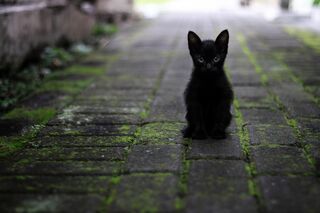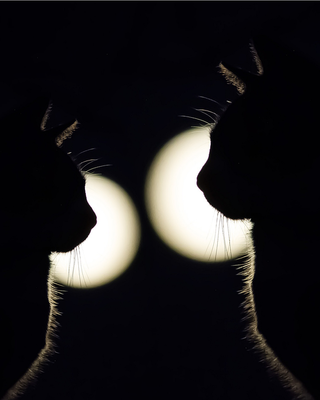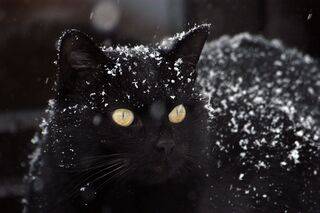Bias
3 Reasons People Don't Adopt Black Cats
Why don’t people want to adopt black cats? Researchers identified three reasons.
Posted October 25, 2020 Reviewed by Kaja Perina

The fur color of a cat plays a significant role in its fate. Statistics indicate that black cats take longer to be adopted than cats of other colors. For example, in a study of shelters in Colorado, solid black cats took an average of 26.55 days (SD = 25.09) to be adopted compared to 20.64 days (SD = 21.02) for their non-black counterparts. Although a difference of 6 days may seem trivial, this additional stay can heighten a cat’s risk of various infections. One study found that each day in a shelter was linked to a 5% increased risk of acquiring an upper respiratory tract infection. Cats may also experience stress-related flare-ups of illnesses (e.g., feline herpes) with prolonged stays in the shelter.
Sadly, black cats are also more likely to be killed at shelters. A recent study of almost 8,000 cats in Kentucky shelters confirmed that compared to cats of other colors, black cats are both slightly less likely to be adopted and slightly more likely to be euthanized.

Anecdotal reports indicate various possible reasons for prejudice against black cats, termed the "black cat bias." It has been suggested that black animals may be more difficult to photograph, leading to less attractive listings. More recently, people speculate that adopters may be seeking more photogenic cats. Other potential barriers against adopting black cats include superstition (i.e., black cats symbolize bad luck) and negative associations of black cats with witchcraft or evil. Black cats may also be seen as both less friendly and less playful, which could potentially be due to difficulties in reading their facial expressions. Finally, researchers speculate that racial prejudice may also underlie the black cat bias.
Thus, in a recent study, Jones and Hart (2019) sought to empirically examine the black cat bias and its explanations.
101 individuals (83% women) participated in their study. Participants completed an online survey in which they rated 20 images of different cats, each with “a neutral facial expression and pose." They indicated how friendly and how aggressive each cat looked, how willing they were to adopt the cat, and how well they could read the cat’s expression. They also completed various measures of their own personality, attitudes, and beliefs.
The researchers found that contrary to expectations, black and non-black cats did not differ in rated adoptability. However, the results otherwise supported the black cat bias and provided three possible explanations for why people do not adopt black cats:
1. People think that black cats are less friendly and more aggressive. On average, black cats were rated as less friendly (M = 35.46, SD = 7.29) than non-black cats (M = 37.10, SD = 7.11), and more aggressive (M = 20.86, SD = 8.09) than non-black cats (M = 19.31, SD = 6.95).
2. People are superstitious. The researchers found that participants who were more superstitious showed greater biases against black cats, viewing them as less adoptable, less friendly, and more aggressive. Superstitious individuals also had less confidence in their ability to read the expressions of black cats, which leads to the next finding.

3. People think that they cannot read the emotions of black cats. The perceived inability to read the emotions of black cats predicted the black cat bias. In other words, those who felt that they could not read the expression of black cats also rated black cats as less friendly, more aggressive, and less adoptable.
Although the researchers confirmed several hypotheses, there were non-significant findings as well. Contrary to their predictions, religiosity and racial prejudice were not related to the black cat bias.
As the researchers note, the study had important limitations. These limitations might explain the lack of the previously documented black cat bias in adoptability. First, the participants were not actually looking for a cat to adopt, and had not specifically expressed interest in cats. Therefore, the sample may not accurately represent prospective cat adopters. In relation, the scenario was completely hypothetical. Participants knew that their responses had no real-life consequences which could have affected their ratings of cats. Last, participants did not actually interact with the cats, which is typically a step in the adoption process. These limitations can be addressed in a future study of prospective cat adopters.
The findings of the study inspire further questions. Could good photography help to display black cats' facial expressions, therefore lessening the black cat bias? Or instead, in the advent of celebrity cats (e.g., Grumpy Cat, Lil Bub), do people intentionally adopt cats that are more likely to become Instagram stars? Are people actually worse at reading the emotions of black cats versus other cats? Finally, might the black cat bias shape the personalities of these felines?
Facebook image: encierro/Shutterstock
References
Jones, H. D., & Hart, C. L. (2020). Black cat bias: Prevalence and predictors. Psychological Reports, 123(4), 1198-1206. https://doi.org/10.1177/0033294119844982
Kogan, L. R., Schoenfeld-Tacher, R., & Hellyer, P. W. (2013). Cats in animal shelters: Exploring the common perception that black cats take longer to adopt. The Open Veterinary Science Journal, 7(1), 18-22.


